The image of a ferocious bull charging with rage is iconic in bullfighting and rodeos. But have you ever wondered what exactly makes these majestic creatures so furious. Why do bulls get angry, and what drives them to unleash their aggression in such a spectacular display of power.
From ancient mythologies depicting bulls as symbols of strength and virility to modern-day arenas pitting against human challengers, bulls have long captured our imagination with their raw power and unpredictable temperament.
Why Do Bulls Get Angry?
The root of a bull’s aggression requires delving into its innate instincts and environmental influences. Genetics significantly predisposes some bulls to be more aggressive, and it is critical to recognize that external factors fuel their anger.
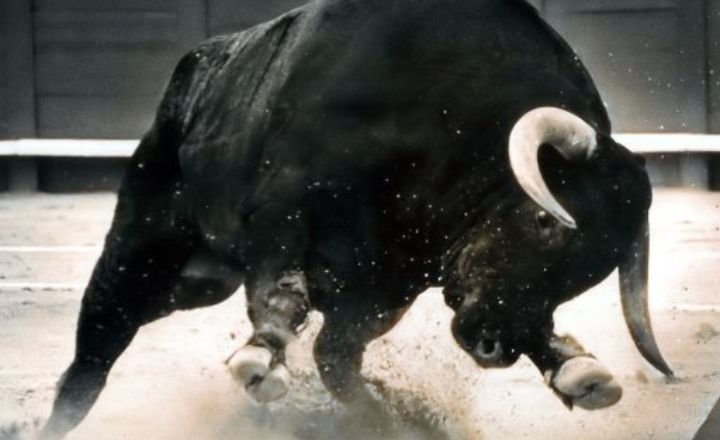
Fear, mishandling, and lack of socialization contribute to the aggressive demeanor seen in many bulls. The constant need to establish dominance within the herd drives bulls to display aggressive behavior as they vie for control and respect among their peers.
Contrary to popular belief, a bull’s anger isn’t solely attributed to inherent traits but is a complex interplay of biology and environment. Bulls’ high hormone levels, coupled with their territorial nature, further exacerbate their aggressive tendencies.
Common Causes of Anger in Bulls
One common cause of anger in bulls is the instinct to protect their territory and partners. Bulls are naturally territorial animals; any perceived threat to their space can trigger aggressive behavior.
They become particularly possessive around cows during the breeding season, leading them to lash out at anything that interrupts the process.
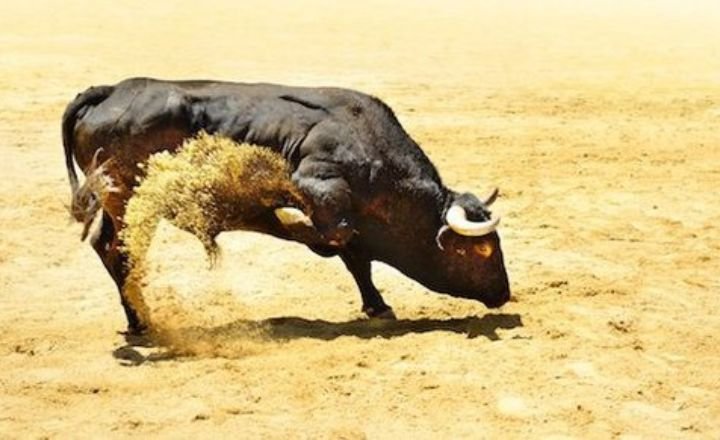
The factor contributing to bull anger is the fight-or-flight response activated when someone is within a close radius. This heightened alertness can make bulls more likely to attack for self-defense or assert dominance. To avoid potentially dangerous situations, people must be aware of these triggers and take necessary precautions when near bulls.
Less Social Interaction
One common cause of anger in bulls is their lack of socialization with humans and other animals. Being isolated for extended periods leads to heightened aggression and reactivity when bulls encounter unfamiliar beings.
This isolation affects their behavior and mental well-being, as social interactions are essential for their overall health.

A farmer’s neglect contributes to bulls’ pent-up frustration. Left to fend for themselves without regular care or attention, bulls can become even more unpredictable and aggressive towards humans and other livestock.
The combination of isolation and minimal interaction exacerbates their hostile tendencies, highlighting the importance of providing proper care and attention to these powerful animals.
Higher Testosterone Hormone Levels
One common cause of anger in bulls is their high testosterone levels, which make them more aggressive than other cattle. This aggression is significantly heightened when a bull is near a heifer in heat, triggering intense and often destructive behavior.
The instinctual urge to mate can lead bulls to display erratic and dangerous conduct, such as charging at anything that crosses their path and even jumping over fences in pursuit of the heifer.
Intact reproductive organs play a significant role in maintaining the elevated testosterone levels in bulls. Unlike castrated beef cattle, where removing these organs reduces hormone levels and aggression, primarily raised bulls retain this natural balance.
Due to the undesirable taste caused by heightened testosterone levels in their meat, consumption of bull meat is uncommon compared to other cattle varieties.
The interplay between biology and behavior sheds light on why bulls exhibit distinct forms of anger not typically seen in cows or steers during mating seasons or when triggered by specific stimuli like the presence of a receptive heifer.
What Do Bulls Do When They Are Angry?
The ferocity and intensity of a bull’s attack are often fueled by fear, territory intrusion, or perceived threats to their safety. Pushed to the brink; bulls exhibit remarkable agility and strength as they defend themselves or their herd.
The sight of a charging bull ready to unleash its power is awe-inspiring and daunting, a vivid reminder of nature’s innate instincts for survival.
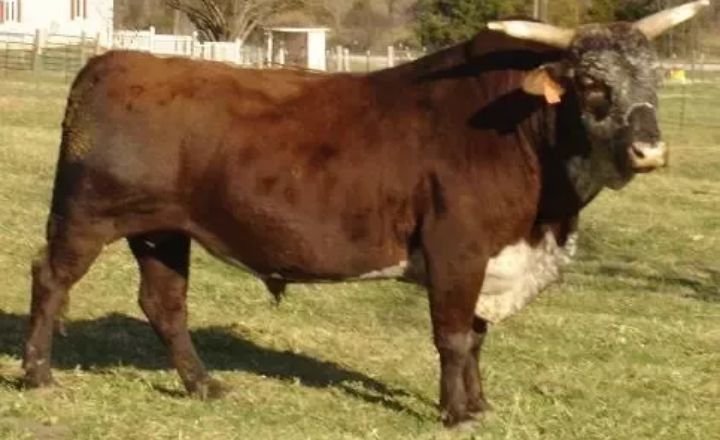
Bulls are well-known for using horns in combat. Understanding that these powerful animals primarily resort to physical aggression when provoked beyond tolerance is imperative. Their kicks can be swift and lethal, delivering staggering force against adversaries or sources of agitation.
The primal nature of a bull’s response underscores the importance of respecting boundaries and recognizing warning signs before escalating tensions lead to potentially catastrophic confrontations.
Aggression in Bulls
Common causes of anger in bulls often stem from fear, stress, or feeling threatened. These magnificent creatures are naturally territorial and fiercely defend their space against perceived intruders.
It’s a rival male bull encroaching on their territory or a human provoking them; bulls can quickly enter fight mode when they feel their safety is at risk.
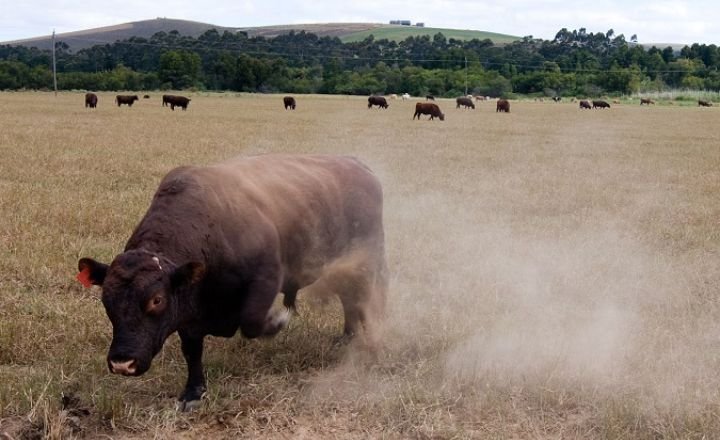
A bull becomes enraged, and its attack can be swift and devastating. With their powerful bodies and sharp horns that they use to maximize damage, the outcome of a confrontation with an angry bull can be painful, dangerous, and even deadly.
It is crucial that these animals exhibit signals of distress to prevent unnecessary conflict and respect their boundaries for coexisting peacefully in shared environments.
Why Do Bulls Get Angry When Seeing Red Color?
Contrary to popular belief, the idea that bulls are provoked by the color red is simply a myth. Bulls cannot perceive red as they are dichromats and cannot see this specific hue.
The aggression displayed by bulls during bullfighting is not due to the color of the Matador’s cape but rather stems from the continuous waving and whipping of the Muleta in front of them.
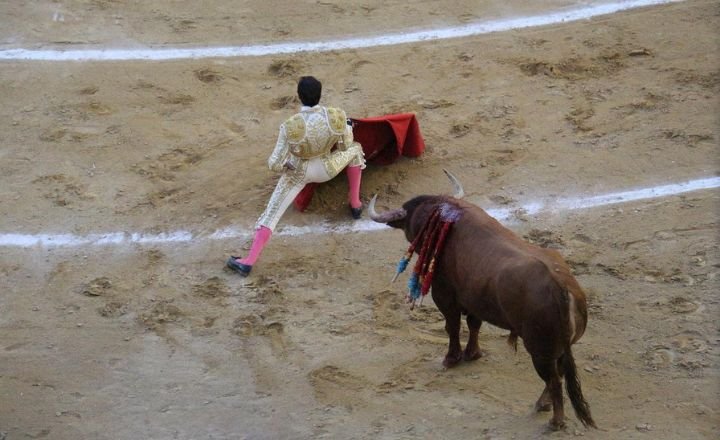
Seeing a Matador flaunting a bright red cape may seem visually striking, but it holds no significance for the bull. Instead, what truly agitates these animals is the movements and sounds made by the Matador during their performance in the ring.
This misconception highlights how cultural practices can perpetuate misleading information, leading many people to believe fallacies about animal behavior during traditional events like bullfighting.
Conclusion
Bulls Get Angry the reasons behind a bull’s anger are complex and multifaceted. Their instincts to protect their territory, herd, and themselves significantly trigger aggressive behavior. Factors such as breeding season hormones and past experiences with humans can also contribute to their anger.
These underlying reasons can help us better navigate bull interactions and prevent potential conflicts. Awareness of these triggers and approaching bulls with caution and respect can mitigate the risk of provoking their aggression and promote safer coexistence between humans and these powerful animals.
